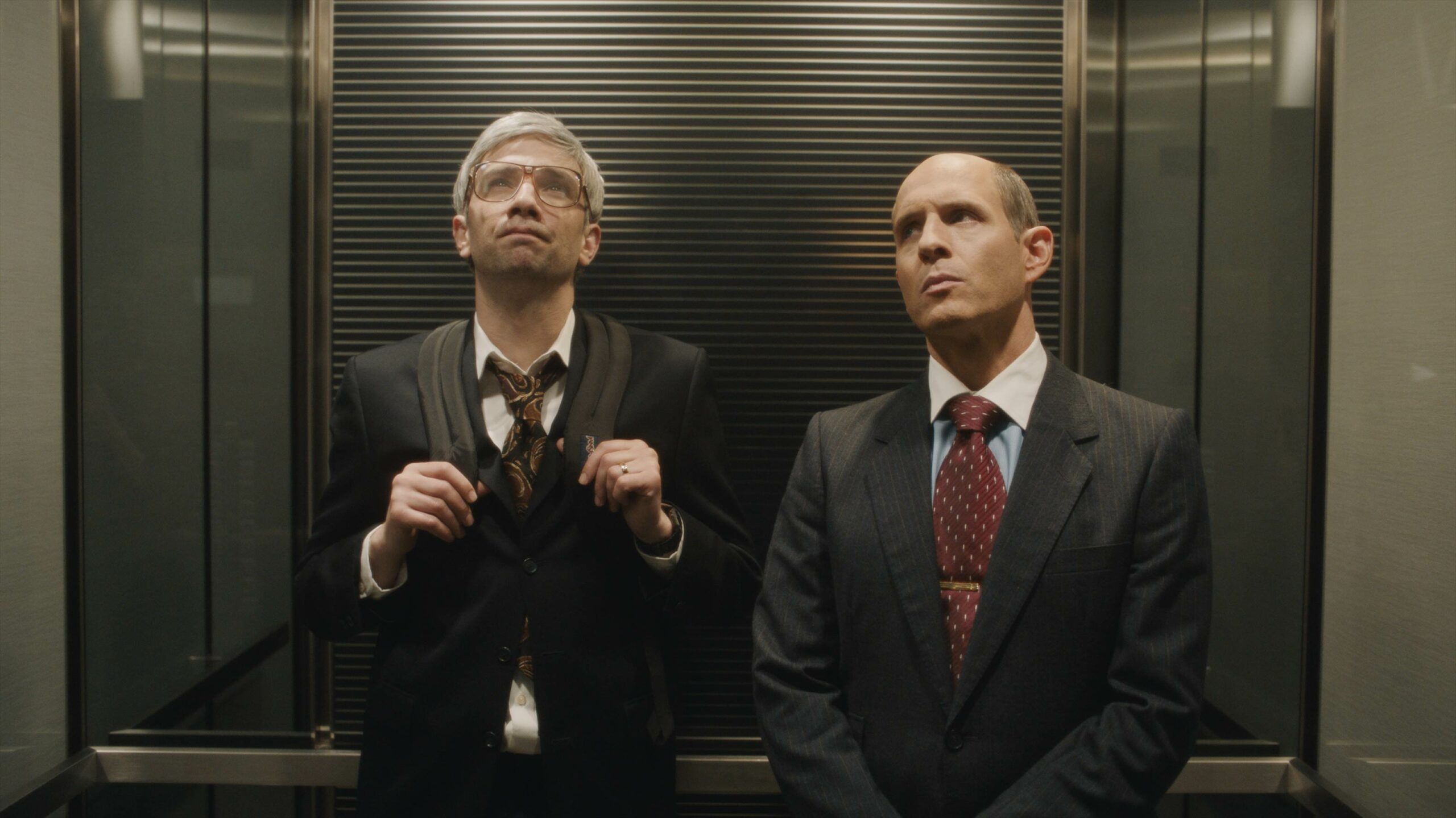
Back in May, BlackBerry was released in North American theatres to massive critical acclaim. Directed with comedic confidence by Toronto’s Matt Johnson (Nirvanna the Band the Show), the film tells the story of the rise and fall of the titular Canadian phone brand from the perspective of Research in Motion (now BlackBerry) co-CEOs Mike Lazaridis (Montreal’s Jay Baruchel) and Jim Balsillie (Glenn Howerton). It was a riotous and tight two-hour experience that’s even getting some early Oscar buzz.
But that’s only half of the story. On November 9th, a limited series version of BlackBerry will be released on CBC Gem and CBC TV in Canada. The three-part miniseries will offer 14 minutes of additional footage interspersed between commercial breaks. It’s a decision that has decidedly puzzled many, who have questioned the existence of the series and insisted people just watch the movie.
But for BlackBerry co-writer and producer Matthew Miller, there’s more to it than that. From a purely business perspective, the answer to that question boils down to a deal with CBC, who helped fund BlackBerry after having originally optioned Losing the Signal: The Untold Story Behind the Extraordinary Rise and Spectacular Fall of Blackberry, the book by Sean Silcoff and Jacquie McNish upon which it is based.
But Miller says this arrangement also provided creative benefits during the making of the film. “It was very much not a linear process,” Miller tells MobileSyrup. “We started thinking about it as a movie, and when we were trying to figure out — since it’s such a huge story and there’s so many sort of pathways you could explore and characters to look at — we were actually trying to scale down the scope of the story for the purposes of a film.”
As part of those discussions, the team looked at the 2010 French-German biographical drama Carlos, which started as a film and became a TV series, and The Trip English comedies, which followed the opposite release cadence.
“And so we thought, ‘How can we structure this as a series?’ because we were thinking about these two things concurrently. And it was actually thinking about the series that allowed us to find the structure of the film, which is very much why the film kind of has three chapters. And each [episode] is about a different period at Research in Motion and a specific event, more or less, that was going on.”
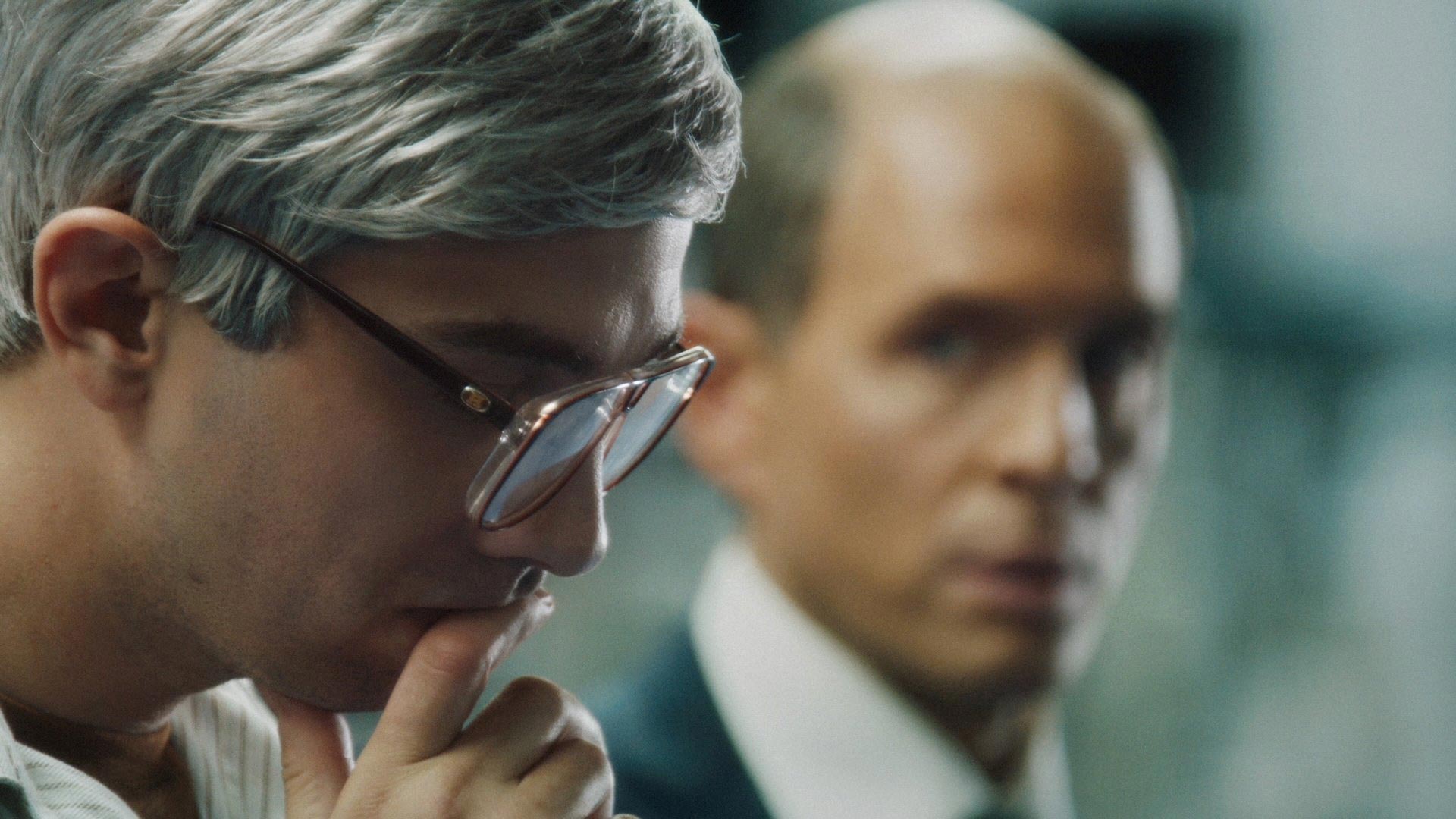
Mike Lazaridis (Baruchel) and Jim Balsillie (Glenn Howerton).
The longer format also gave the filmmakers more flexibility in the editing process. An example of that is an amusing Face/Off gag between Lazaridis and Fregin in the third episode.
“That was actually something very early that we shot and then cut out of the film. But it was a little bit easier to take out of the film knowing that we were likely going to have the opportunity to resurrect it in the series. I think we knew that we would have a little bit more time in the series to explore some of these things,” he explains.
“What’s going on at that part of the movie — it’s like we’re really ramping things up and having that scene between [RIM co-founder] Doug [Fregin] (Johnson) and Mike on the plane after the scene at Verizon. It really felt like it was slowing things down, and that we needed to get back to Jim. But in the series, it’s a totally different experience because the rhythm and pacing are so different. We built in commercial breaks, which allow us to do different things, and we get to leave a character and the audience comes back three minutes later. So it’s totally different. We always say when you’re editing a movie that you ‘kill your darlings,’ and we’ve never had the experience of getting to bring them back, so that was really exciting.”
Expanding the story
Of course, getting to spend more time with these characters also lets you appreciate their quirks all the more. Nowhere is that more apparent than in Fregin, whose endearing goofball personality starkly contrasts the softspoken Mike and fiery Jim. Throughout the film, he wears a litany of delightful old pop culture shirts that include film classics like Army of Darkness and The Thing. But his attire also represents video games like Doom and Wolfenstein, so naturally, I had to ask Miller about that. “It was certainly stuff that Matt, specifically, was playing before. He’s much more of a gamer than I and so I relied on him to steer us in the right direction there,” admits Miller.
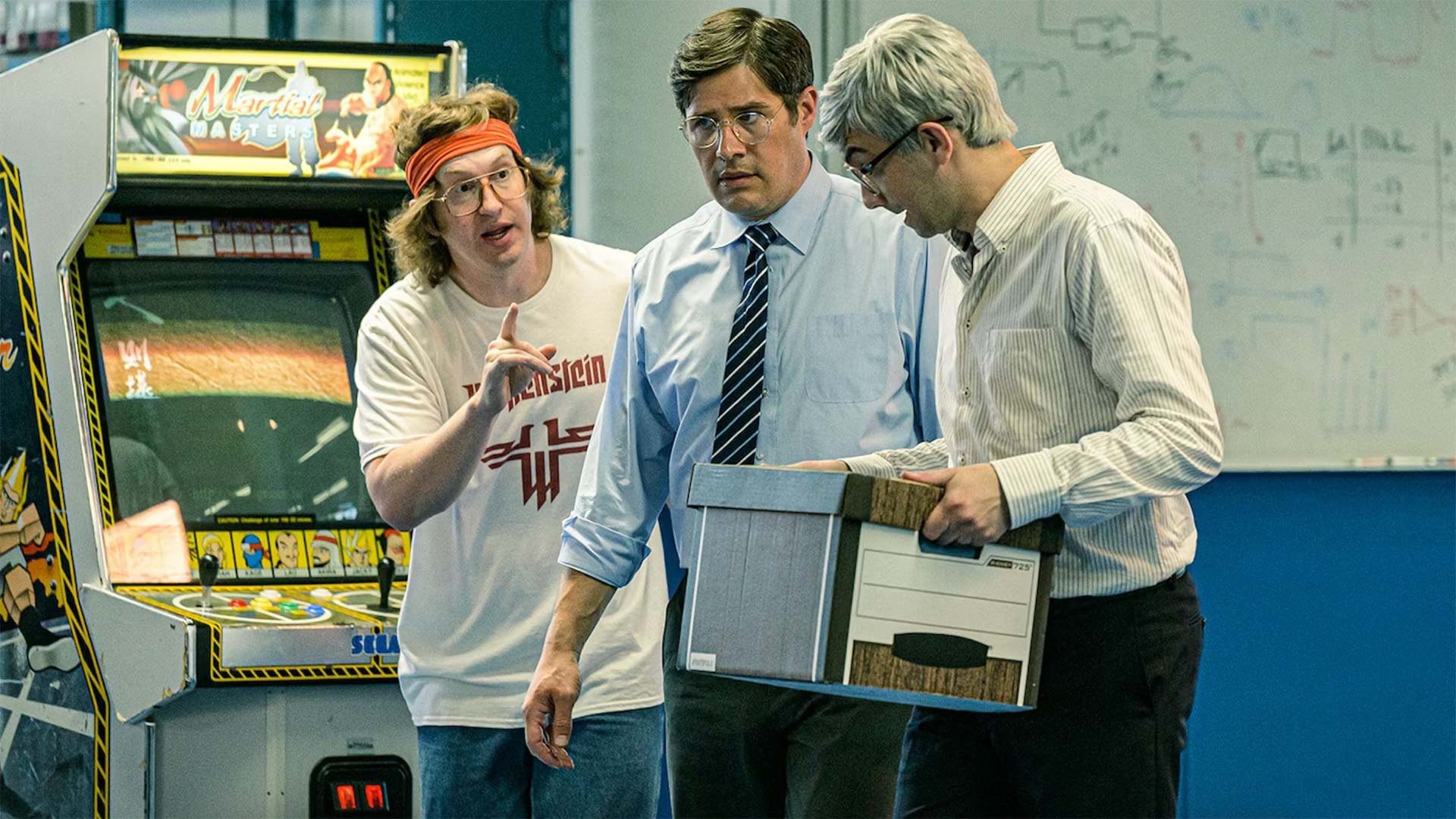
Doug Fregin (Johnson), Paul Stannos (Rich Sommer) and Mike Lazaridis (Baruchel).
That said, they wanted Fregin’s love of pop culture to be more than just some fun visual nods.
“When we talked about the culture at RIM, and who these guys were and would have been — specifically the guys early on in the film before they’ve had success — they were using a lot of students from the University of Waterloo. And we really wanted to sort of understand what attracted these guys to go work there for very little money. And it was this idea that back in the ‘90s, being a nerd meant something different than what it means today,” he says, noting that they wanted to explore why the RIM employees all loved Star Trek.
“The idea is that you’re a young person in the ‘60s and ‘70s growing up and watching Star Trek on TV and watching the tools that these guys are using, and thinking, ‘We could probably do that. How would we do that?’ And then you got together with other like-minded people and you figure it out together. But it was really early science fiction that I think led to the technological revolution that we’re having today. And it’s not a coincidence, in our opinion, that so many people who go work at these places are people who grow up being enamoured by comic books and science fiction, movies and novels and things along those lines.
On the flip side, Howerton’s Balsillie is anything but a nerd; it’s mentioned in the film that he’s never seen Star Wars. Instead, the lifelong hockey fan carries himself with bravado, both in business dealings for RIM and a side venture to purchase the Pittsburgh Penguins. To that end, the episodic format gives us a bit more time with NHL commissioner Gary Bettman (St. John’s, Newfoundland’s Mark Critch), which makes Balsillie’s boardroom failures all the more impactful. In fact, arguably the best line of any movie this year comes when Balsillie threatens the NHL by saying “I’m from Waterloo — where the vampires hang out!” It’s a hilarious line that comes from a viral 11-year-old FashionStudio7 interview, and Miller says it’s been a “favourite” of his and Johnson’s for years.
“As Matt and I were spending some time in Waterloo when we were writing and doing research, it was funny to be in Waterloo and thinking about that line. And then I honestly think that was Matt doing a pass on that scene and he just wrote it in. And he sent it to me to look at and I just started laughing. I was like, ‘We can’t put that in the movie.’ And he’s like, ‘We should, it’s great!’” says Miller of the line’s inclusion. “What’s crazy with us is that people who did not get the reference will say that’s their favourite line in a movie this year — which is amazing and we love it. But it’s like: we don’t even know what that line really means. Like, why is Jim saying that at that moment? But we know that it really works and it resonates. And obviously, Glenn’s performance is so incredible and he sells it. We don’t question it because he believes with every fibre of his being that this is the right thing to be saying. So we’re really excited about how it’s landed; it gets crazy laughs every time we see screen it anywhere and we think it might it might have a long life as a bit of a meme.”
The future
One of the more interesting creative choices regarding BlackBerry is that it ends in 2007 with the introduction of the iPhone.
Clearly, there’s a lot of additional material that could be mined there, especially considering RIM exited the phone business and pivoted to cybersecurity. Even just last week, CEO John Chen exited the company after a 10-year tenure. The thought of more BlackBerry also comes to mind considering recent comments from The Social Network director David Fincher about potentially revisiting the Facebook story given everything that’s since happened with the company. Naturally, I had to ask Miller if there was any interest in doing the same for BlackBerry.
While Miller is quick to say he’d “be there opening night” for a sequel to The Social Network from Fincher, screenwriter Aaron Sorkin and star Jesse Eisenberg, he’s generally “not a proponent” of these kinds of follow-ups. He adds that when it comes to BlackBerry, he and Johnson were more interested in what happens to Lazaridis and Balsillie in this time period than they are with anything years down the line.
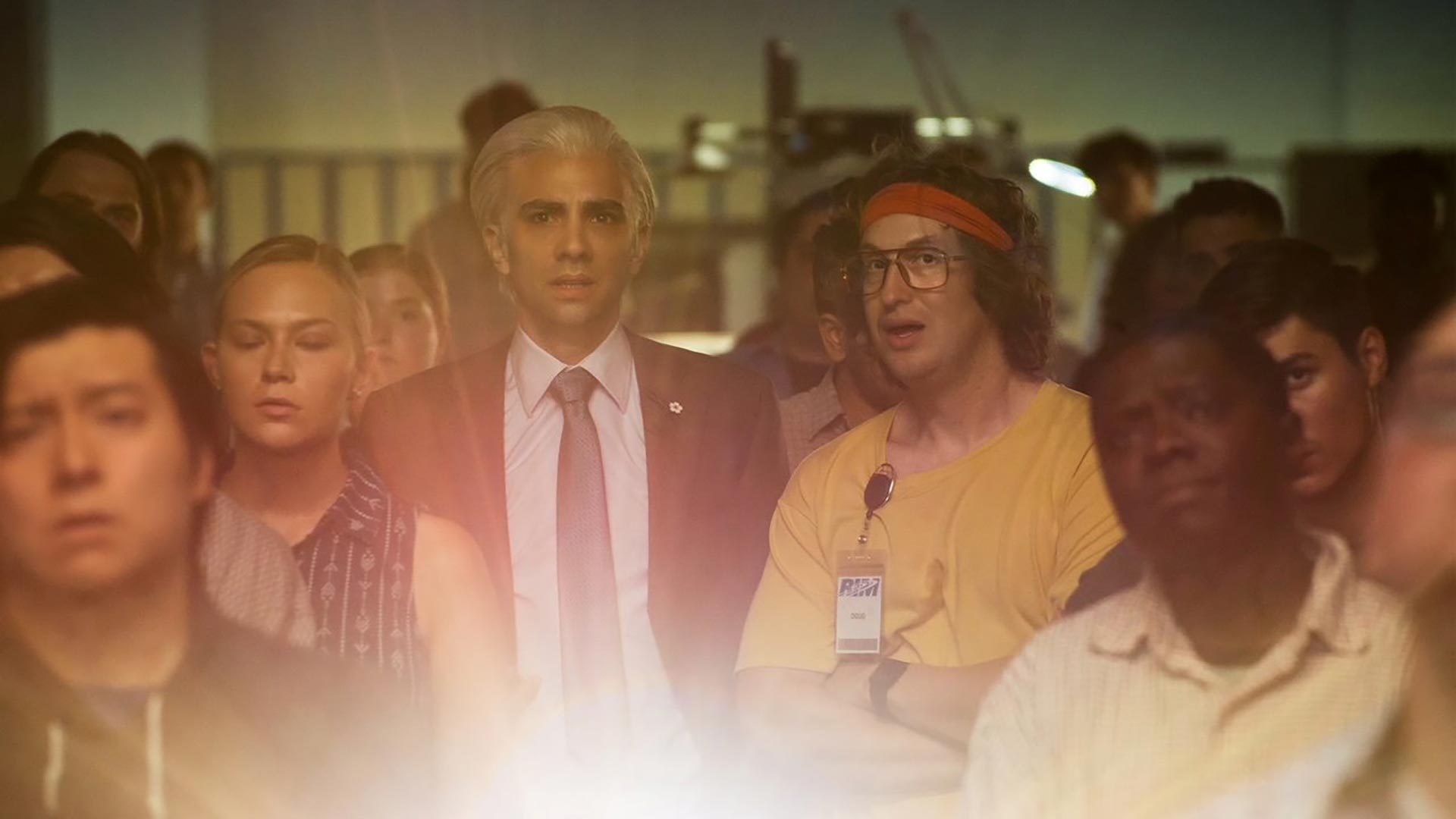
Lazaridis and Fregin watching Steve Jobs’ iconic iPhone reveal.
“Essentially, our story ends in 2007 with the launch of the iPhone, and it’s not like the iPhone came out and buried BlackBerry overnight. It was a much more drawn-out process and BlackBerry still held a good share in the market,” he says. “But it was on the downturn, that’s for sure. And for us, it just felt like as soon as the writing was on the wall, we had to get out of the story, because it was not going to be that much fun to watch the whole thing coming down in a really ‘piece by piece’ kind of way.”
He adds that he and Johnson are more connected to Lazaridis and Fregin, especially in those early days.
“It shows the very best of what happens when we get like-minded, intelligent people putting their heads together to try to figure things out. And I think for Matt and me, the reason we connected so deeply with the story was that what those guys were trying to do in the mid-’90s with their friends above a bakery in Waterloo is so similar to what we were trying to do 20 years later in Toronto,” he says. “Making movies with friends and just trying to figure out how to do it — ‘How do you get them out to the world? How do you make money doing it?’ They were faced with all the same problems as we were and so it became a lot easier to figure things out once we realized.”
None of that is to say he doesn’t still think about the BlackBerry phone line.
“I miss my Blackberry every day. I had one in the mid to late aughts right through probably 2012 or 2013, and I loved it,” he says, noting that — like Baruchel — only switched over to join group chats. “But it was so funny because iMessage and the idea of iMessage and how that works is so based on BBM. Because it was five years earlier on BlackBerry how you could talk to them through BBM professionally and socially, and it literally got replaced by the iPhone as the [BlackBerry] series dramatizes.”
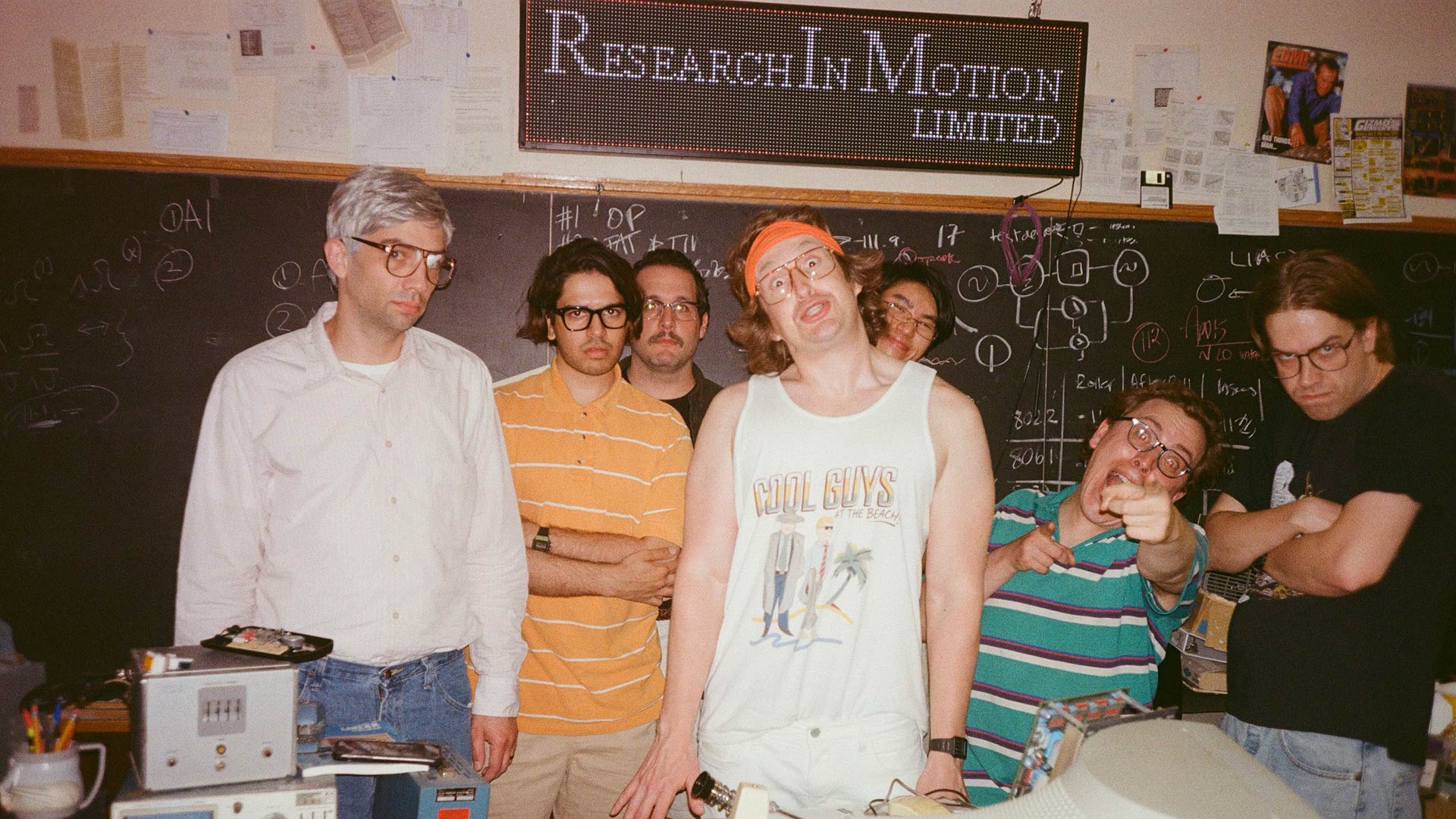 When asked which was his favourite BlackBerry model, he’s quick to shout out the Bold. “That’s the one that I felt that they really hit their stride. It was fun to get to play them as we were shooting the movie. We would do little races to see who could type the fastest — they really are amazing little tools. We took apart a bunch when making the movie and got to look inside them — it was crazy.”
When asked which was his favourite BlackBerry model, he’s quick to shout out the Bold. “That’s the one that I felt that they really hit their stride. It was fun to get to play them as we were shooting the movie. We would do little races to see who could type the fastest — they really are amazing little tools. We took apart a bunch when making the movie and got to look inside them — it was crazy.”
On a broader level, he adds that he’s happy to have been able to work with fellow Canadians to explore such an iconic Canadian creation.
“We’re so proud that we got to tell this story — that we were trusted with the story. It’s one of the big ones we have in terms of really outstanding success stories to come out of Canada and it really had an indelible impact on the tech world and everything we do today in work and play. And so it was very fun to get to get to be Canadian champions because most people outside of Canada have no idea that BlackBerry was a Canadian invention — that RIM is a Canadian company,” he says.
“It speaks to our modesty, our inability to self-promote, all these kinds of things. And so it was really fun. A lot of people really respond to that, especially in Europe. They thought it was an American company but now they know it’s not, they have to completely recontextualize what BlackBerry was as a Canadian company. It’s an unbelievable success story.
This interview has been edited for language and clarity.
BlackBerry (the series) will stream in its entirety on Thursday, November 9th on CBC Gem for free with ads. (A $4.99/month Gem Premium membership is also available.)
Additionally, the BlackBerry series will air on CBC TV on November 9th at 9pm ET, with new episodes to be released the subsequent Thursdays.
Image credit: CBC
MobileSyrup may earn a commission from purchases made via our links, which helps fund the journalism we provide free on our website. These links do not influence our editorial content. Support us here.


